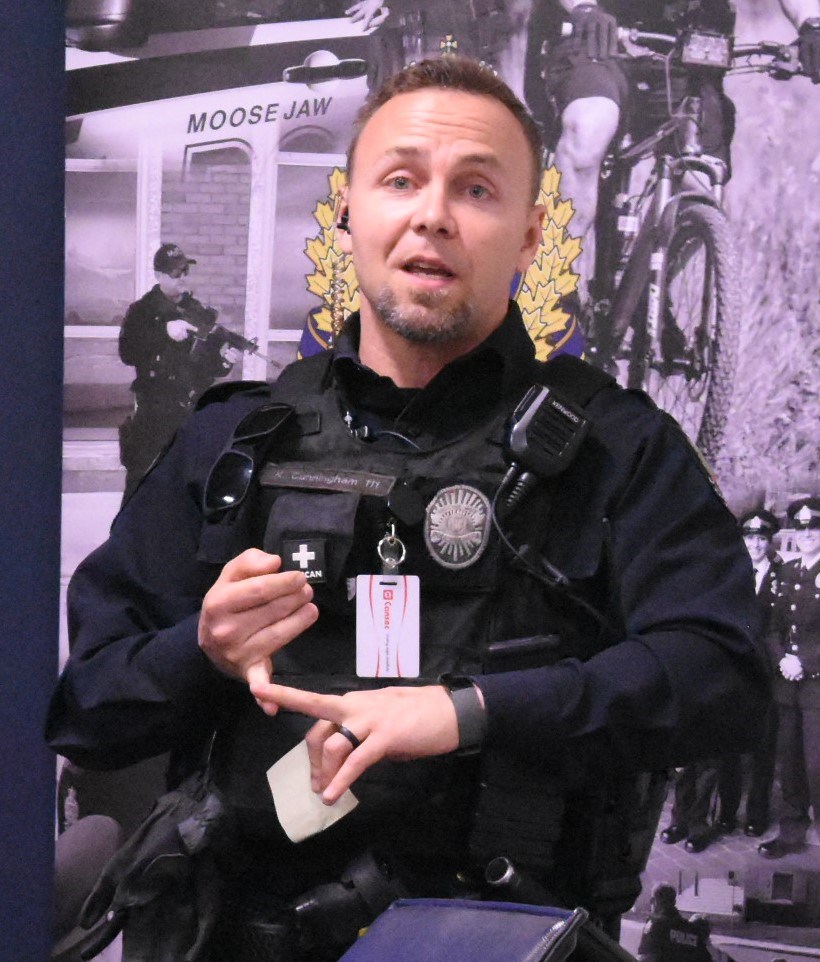MOOSEJAWTODAY.COM — Front-line patrol officers respond to dozens and dozens of incidents daily during their shifts, which means they must prioritize the calls similar to how emergency triage functions.
“No two days are the same, so it adds to the excitement of things, but it can also sometimes wear members down a little bit more, too, because when you’re running up here (to headquarters) all the time (to write reports), it can be tough to decompress and cool yourself down,” Const. Kyle Cunningham said.
Cunningham, the acting street supervisor for the Moose Jaw Police Service (MJPS), spoke to the Board of Police Commissioners during its May 2 meeting about street patrols and front-line policing. He noted that patrols are the agency’s “bread and butter” and comprise its largest group.
Front-line patrol officers work 12-hour shifts — either 7 a.m. to 7 p.m. or 7 p.m. to 7 a.m. — which means the MJPS can cover the community 24 hours a day, seven days a week, he said.
A front-line patrol consists f eight members: a staff sergeant, a sergeant and six constables.
“So we’ve always got men and women here willing and able to answer the call, no matter what the call is,” Cunningham remarked, noting two officers will soon finish police college and “cut their teeth” by starting on the streets.
Data shows service calls have increased significantly over the years — they increased 3.5 per cent in 2023 over 2022 — and the public expects officers to meet that demand, he continued.
The MJPS receives 30 to 50 calls during the day and 20 to 25 calls during the night, which means some members handle over a dozen calls during their shifts, the constable remarked. This can be difficult since plenty of work goes into solving calls, whether they’re simple or challenging and time-consuming to investigate.
Patrol is sometimes about “jumping around” and focusing on what’s important, similar to an emergency room prioritizing triage cases, said Cunningham. This means residents may have to wait for an officer after a call is sent.
“For our members, they’re awfully, awfully busy. There’s no doubt that they’re taxed with the calls of service they’re facing,” he continued.
Therefore, officers must use the knowledge and skills they’ve acquired and understand bylaws, legislations and acts to solve situations.
“In Moose Jaw, we do a great job … . We do a lot with less than some other agencies do. So our members are actively investigating things and working their butts off out there clearing files, solving crimes and doing that enforcement piece,” Cunningham said.
Situations such as alarm calls, fires, collisions, in-progress break-ins and assaults are issues that front-line officers must tackle immediately, while they must also manage their time and ensure they are meeting the community’s needs, he continued.
New technology makes it easier for officers to submit reports from their vehicles while remaining in the community and being proactive in their work, said Cunningham.
Furthermore, having a small police agency means members can investigate a call from start to finish without needing to pass it to someone else, which is something recruits appreciate, he remarked.
However, this approach can be somewhat burdensome because members face more paperwork and must produce more reports. Moreover, they may be called away to another situation and must return later to finish their reports.
“We never know what kinds of calls we’re going to get when we answer the bell every time. And so for some members, it’s a challenge,” the constable said.
Dayshift members may pass files to their nightshift colleagues depending on the situation, such as finding someone or protecting a victim, Cunningham added. Otherwise, officers will keep their files for the next day, which may frustrate some residents who believe police aren’t concluding their issues fast enough.
The next police board meeting is Thursday, June 13.




